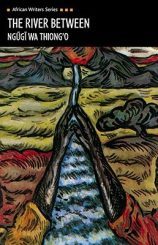The book is a story of several divides and an attempt at unification. It begins by describing a geographical separation of two territories, Kameno and Makuyu, by the Honia river. However, a progression of the story unveils several other divisions, the most prominent being religion – Christianity and the Indigenous Tradition. Interestingly, Mugo wa Kibiro had predicted the coming of “people with clothes like butterflies”. These were the white men who introduced Christianity to the people of Kameno and Makuyu. The introduction of Christianity became the event that laid the foundation of all other divisions in the book.
The first of many quarrels in the book was between two young boys, Kamau and Kinuthia and the reason being that Kamau’s father had followed the white man’s ways. Kinuthia called Kamau’s father a White man’s slave and Kamau in response made jest of Kinuthia’s economic standing by calling him a beggar. The quarrel was settled by another major character, Waiyaki, the son of Chege whose father was an influential figure in Siriana. Chege’s influence was because he knew “more than any other person, the ways of the land and the hidden things of the tribe”. Some people imagined he had magic while others thought he was a seer like Mugo wa Kibiro. The book, through Chege’s character, exhibits the level of influence that a knowledgeable man wields.
Chege’s influential nature flows down to his son, Waiyaki. Although Waiyaki had displayed, signs of influence in his formative years, knowledge gained from his education at the white man’s school proved to be a large factor in the eventual influence which unfolded in the book.
The book also tells the story of courage through the character of Muthoni, the daughter of Joshua and Miriamu. Joshua, a staunch Christian had forbidden his family from having anything to do with the traditional culture. Muthoni, however, was determined to partake in circumcision of young ladies which was a tradition of Gikuyu. Her decision to escape from home to partake in the ceremonies and be circumcised led to Joshua renouncing her as his daughter. Although she was warned not to partake in the ceremony by Nyambura, her older sister, Muthoni was determined to be circumcised and not even the fear of her Joshua, was going to stop her. Her desire was to “be a woman, made beautiful in the tribe”.
Unfortunately, Muthoni’s story of courage and defiance ends in her untimely death from the wound of the circumcision. She however became a legend. Some people believed that she had not actually died of the wound but had been poisoned by the missionaries. However, her father, described her death as a punishment from God. Notably, Muthoni and Waiyaki had formed a bond before her death. Waiyaki was one of the last persons to see her alive. She gave him an ironical message to deliver to her sister. Muthoni said that she had seen Jesus, and that she was a woman, beautiful in the tribe. In essence, she combined the reward of Christianity (seeing Jesus) with the reward of tradition (circumcision). This attempt at harmonizing the two conflicting ideals continues throughout the book.
Chege also created a mixture of the offerings by the white man and tradition. He sends his son to the white man’s school but warns him not to forget the ways of the tradition. Eventually, Waiyaki is sent away from the school because he was not a Christian. Waiyaki then offers the white man’s education to the children of Siriana who were not Christians. Also, Waiyaki is loved by Nyambura, who is a Christian. The several cocktails of Christian and non-Christian values are an exposition to the possibility of creating a balance in life whilst adhering to different worldviews.
Another highlight from the book which is noteworthy is the romantic connection between Nyambura and Waiyaki. Nyambura, unlike Muthoni, was “obedient” to her father and abided with the Christian values. However, she loved Waiyaki, a feeling which was mutual. Waiyaki asked her to marry him, but the only thing stopping her from marrying the one she loved was the religion of love and forgiveness. She eventually disobeys her father and follows Waiyaki to be his wife.
The book also tells the story of envy and betrayal through the character of Kabonyi, a village elder who was previously part of the Christian division with Joshua. He was the father of Kamau. Kabonyi’s betrayal of Joshua and the Christians is second only to his envy and hatred of Waiyaki. Little wonder, he instigated all manner of rumors about Waiyaki including how Waiyaki had joined Joshua’s church and how he planned to sell the people to the white men. Waiyaki only went to the church to see Nyambura and to convince some men to join the new school that he had convinced the elders to build.
It was prophesied that a messiah would emerge to save the people from the white men. The role of the messiah seemed contested by Kabonyi and Waiyaki. It seemed Waiyaki would emerge victorious, but the author is silent on the victorious one. However, it is unlikely that Waiyaki emerged as he was adjudged to have violated the oath he took.
The book ends with many questions unanswered. Questions like who was the Messiah, Was Waiyaki sacked from the school, what became of Waiyaki and Nyambura, and was the reconciliation mission of Waiyaki achieved? The story ended with questions which leave a reader with the feel of eating a half-cooked meal.
In all, the 1965 novel is still very relevant today. The story of cultural differences is the present story of many African countries.

